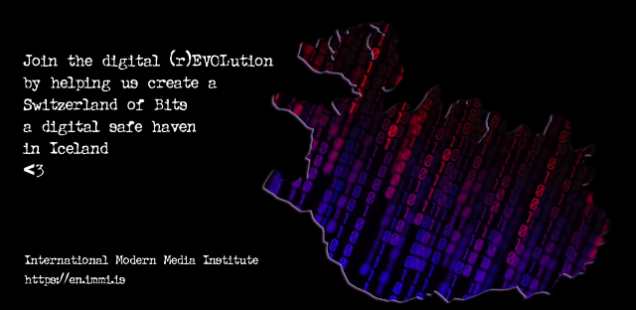Interview with the Director of IMMI | PirateTimes

Interview with the Director of the International Modern Media Initiative
The Pirate Times connected with Guðjón Idir in Iceland to ask some questions about the International Modern Media Institute that is running a crowd funding campaign. Its aim is to form Iceland and other nations into a “Switzerland of Bits.”

Guðjón Idir became IMMI’s Executive Director in January 2014.
His background is in philosophy, psychology and activism.
He has a passion for information freedom, human rights and has worked with refugees in Iceland.
He also dabbles in music.
Pirate Times: What laws or policies has IMMI been able to change up to now?
Guðjón: Since IMMI’s inception, a new Information Act took effect (2013) – source protection is enhanced and we’ve already seen the Supreme Court rule in the favour of source protection in a highly publicized case.
IMMI has also prevented efforts for the EU data retention directive (now invalidated by the European Court of Justice) to be adopted in Iceland. Instead, Iceland has its own law on data retention. Which IMMI is fighting to have removed.
Pirate Times: How did IMMI manage to achieve those regulatory and legal changes?
Guðjón: Any changes in policy or legislation comes through advocacy and research. IMMI submits written observations to parliament, attends parliamentary committee meetings (when called for), takes part in two ministerial working groups, engages with experts and raises awareness.
Pirate Times: What other policies or laws would IMMI like to change?
Guðjón: The laws we are focusing on are:
- defamation law reform,
- removal of data retention,
- whistle-blower protection,
- intermediary limited liability,
- virtual limited liability companies,
- data protection,
- and an improvement of FOI.
There is, however, a growing need for an International effort to protect whistle-blowers.
Pirate Times: Are there any other regulatory or legislative proposals that IMMI has?
Guðjón: IMMI is working on legislative changes within two Ministerial working groups. IMMI also helped draft the IPU resolution: Democracy in the Digital Era and the Threat to Privacy and Individual Freedoms.
Pirate Times:What is the relation between IMMI and the Pirate Party?
Guðjón: The institute was established by individuals who later established the Pirate Party in Iceland. Both focus on freedom of information, protection of individual rights, and the underpinnings of a meaningful democracy.
Pirate Times: How would IMMI progress, if they do not manage to reach their funding goal?
Guðjón: We will be doing all we can to make sure we keep operational. The crowdfunding campaign is currently at 33%. That gives us 2 months. We are hoping to see it reach 100% which gives us half a year to ensure other sources of funding, which we are confident we can do.
Pirate Times: What can someone outside of Iceland do to help?
Guðjón: Raise awareness. Organise around similar objectives in their own countries. There are quite a few NGOs fighting for Internet freedom and the like, and they are all invaluable.
Currently, IMMI really needs financial support, so any help in that regard goes a long way. IMMI is fully independent, does not receive any state funding, but relies wholly on donations and project-based grants.
Pirate Times: Would donating to IMMI mean that the Pirates have more time and resources to devote to campaigning?
Guðjón: No. It would mean that the Pirates, along with the other political parties, would have a strong watchdog and advocacy group fighting and pushing for some of their core objectives.
Pirate Times: How does IMMI benefit people in other legislatures?
Guðjón: The intention behind IMMI was always global in focus. If there is a place where journalism and individual rights are protected, it changes everything. It both allows those working within the jurisdiction to enjoy the legal protections, whilst also encouraging others to follow suit. As we are dealing with a digital reality that is more borderless, the prospect of a country truly valuing freedom of information and free expression, will affect public debate in a much wider sense. Various media and NGOs could operate from within Iceland. Content can be hosted in Iceland. And what we are looking into with Virtual Limited Liability Companies, is whether a company can be registered in Iceland only virtually, to enjoy the legal protections we are fighting for.
The IPU resolution we worked on was adopted by the 166 countries that the IPU consists of and can, and should, affect local laws in all of those countries.
Pirate Times: Is there a way of introducing IMMI laws to other countries?
Guðjón: Yes. This is a model any one can push for. In Iceland, there was a parliament that unanimously adopted the IMMI resolution. The first step is getting broad support. Then there is a host of different laws that need focusing on in order to create an environment that respects individual rights and promotes journalism and enlightenment. The IMMI institute also functions in an advisory capacity and it should and will promote such legal reform around the world.
Pirate Times: Are there any plans to start institutes in other countries?
Guðjón: Not as of yet. At the moment we are fighting to stay operational in Iceland. The next step up from that objective is to level up and increase our capacity. If everything goes as well as it can, further international cooperation would be a natural trajectory.
Pirate Times: Is there any collaboration with organizations, in other countries, that are similar to IMMI?
Guðjón: IMMI collaborates with various different NGOs, in various different International efforts. IMMI also has an advisory board that includes people from other organizations.
Pirate Times: How do you research relevant laws from around the world?
Guðjón: Through its network of experts and activists. IMMI has often mentioned the need for a database of best practice law from around the world in matters relating to individual rights, freedom of information and the other fields in which IMMI operates. This is something IMMI would like to be a part of creating.
The Pirate Times would like to thank Guðjón Idir for the interview. You can help IMMI by spreading the word about IMMI, its website and donate to the Switzerland of Bits campaign.
All images by IMMI, CC BY-SA

About Andrew Reitemeyer
I joined the Pirate Party of Lower Saxony in Germany in April 2012, once I found out that non citizens were welcome to join and become active members of the Party.
I joined the Pirate Times soon after it was started as a proof reader and am now an editor and author. Since then I have returned to my native New Zealand and joined the Pirate Party of New Zealand.
Politically I come from the libertarian left and have, up to now, not regarded any political party as having a solution for the democratic deficit that envelops the world. With the advent of the Pirate Party, which truly embraces grass roots democracy, I have found a political home. The Pirate Times is a way I can contribute to furthering the Pirate Movement around the world.
Skype: frithogar
All content is CC-BY if not mentioned otherwise. Please link back to us if using content.

















Recent Comments